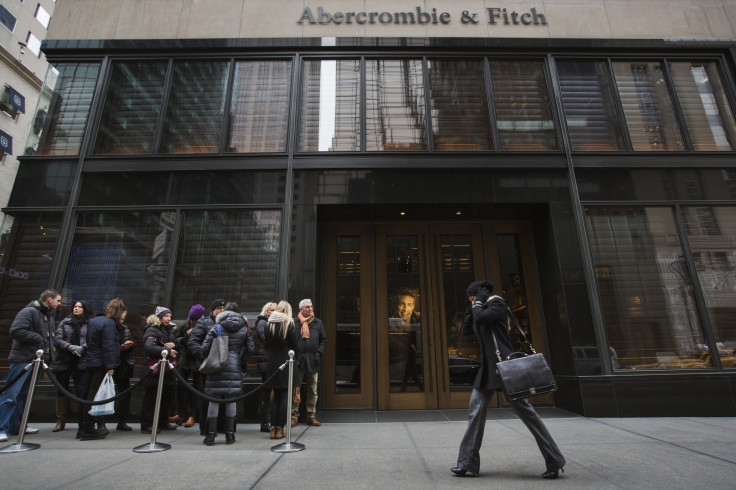Abercrombie Goes To Court: Supreme Court Takes Up Religious Accommodation In The Workplace As Employment Discrimination Questions Linger

The U.S. Supreme Court on Wednesday will hear oral arguments for Equal Employment Opportunity Commission v. Abercrombie & Fitch, a case with major implications for American workers. The narrow question at stake is whether employees must explicitly ask their bosses for religious accommodation in order to be protected by federal anti-discrimination statutes. But the court’s decision may carry sway over disabled and pregnant workers, too.
In 2008, Samantha Elauf, 17, applied for a job at Abercrombie & Fitch, the fashion retailer known for its “look policy,” which restricts what employees can wear on the job. (The policy has come under fire for discriminating against black, Latino and Asian workers.) Elauf’s interviewer liked her but wasn’t sure if the company could hire her because she wore a hijab, a headscarf worn by some Muslim women. Eventually, a senior supervisor stepped in and rejected the application. The official reason: The headwear clashed with the company’s dress code, which is based on “the preppy look of the Ivy League,” according to court papers.
Elauf learned her hijab was a sticking point, and the EEOC sued Abercrombie on grounds of religious discrimination. A federal District Court in Tulsa, Oklahoma, agreed with the agency and awarded Elauf $20,000. But the decision was overturned on appeal in 2013, when an appellate judge in Denver ruled it was Elauf’s responsibility to ask for a religious accommodation. Since Elauf never told the interviewer she wore the headscarf for religious reasons, how could Abercrombie have known it needed to accommodate her, the logic goes.
Labor advocates say the case is clear-cut.
“It’s ridiculous to assert Abercrombie did not have actual knowledge of the need for a religious accommodation,” says Yolanda Rondon, staff attorney at the American-Arab Anti-Discrimination Committee, which filed an amicus brief in favor of the EEOC. “What they’re saying is yes, I saw she had a hijab on, but she didn’t tell me she was Muslim, so there’s no liability.”
That’s akin to a retailer not hiring a man because it wants to hire attractive women, then arguing it didn’t discriminate on the basis of sex because the man never clarified he was a man, Rondon argues.
“The issue is whether a company can, through a dress code, have the consequence of requiring somebody to abandon their religious beliefs,” says Alan Lescht, a labor lawyer in Washington. “It seems to me like she has a pretty clear case.”
“You have an employer that operates a highly stylized dress code; they see the employees as a kind of extension of the product,” Lescht continues. “But is it really going to harm their business or cause them undue hardship [to provide an accommodation]? I don’t think so.”
Having taken the case, the Supreme Court may clarify that it’s up to employers -- not employees -- to address potential conflicts of this sort. In that scenario, the court’s ruling could extend to disabled people and pregnant women, other classes granted protections and accommodations under the EEOC. By the same token, a sweeping decision in favor of Abercrombie could shift responsibility to employees to flag any potential need for accommodations.
In other words, a visibly pregnant woman applying for a job would have to specify that she is, in fact, pregnant. Otherwise, she would effectively be granting the boss more leeway to reject her application.
Rondon argues this scenario would be deeply unfair. Prospective workers shouldn’t be expected to know the specific policies of companies they’re interviewing with. Also, it reflects poorly on potential hires to ask a lot of prying questions during interviews.
What are the chances of the court siding with the retailer?
This is arguably the most employer-friendly Supreme Court in decades. Last year’s Hobby Lobby decision famously -- or infamously -- allows corporations with religious owners to avoid paying for insurance coverage of contraception.
Still, it’s unlikely the court would do anything so dramatic in this instance, according to Lucretia Clemons, a management-side lawyer at Ballard Spahr. “It would be a change in practice if the court sides with Abercrombie,” she says.
Greg Nevins, a lawyer at LGBT rights advocate Lambda Legal, which also filed a brief on behalf of the EEOC, agrees: “The court in Denver is really the only one using that kind of logic."
Nevins has another concern: The prospect of the court “going overboard on religious freedom at the workplace.”
As it stands, the court recognizes limits as to what constitutes “reasonable” religious accommodation. In a well-known case, for instance, it allowed a company to fire a woman who insisted on wearing an anti-abortion pin depicting a fetus and who was upsetting co-workers. It would be unfortunate for the court to wade too deeply into those matters, Nevins says.
Rondon says Samantha Elauf’s expression of religious identity is more than reasonable. And at a time of bubbling anti-Islam sentiment across the country, the court should act to protect Muslim workers from overly intrusive employers. Abercrombie has waded into religion by trying to argue the hijab isn't actually required by the Quran. What's far more important, Rondon says, is that plenty of Muslims feel that it's part of faith.
“It’s not up for Abercrombie to decide what’s a requirement of Islam."
© Copyright IBTimes 2024. All rights reserved.






















